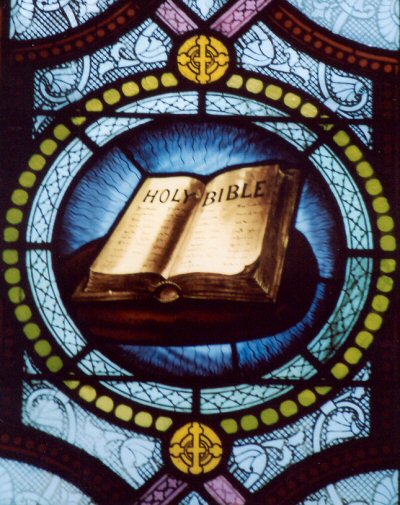
Liturgy of the Word
Twentieth Sunday in Ordinary Time
August 17, 2014, Cycle A
Green priestly vestments symbolize hope and the vitality of
the life of faith.
Home Page
Liturgical
Year Cycle A 13-14
Introductory Acts Of Worship
The Entrance Prayers:
On Sunday, usually a hymn praising God
is sung in place of reciting a Psalm from the Bible which invites us to
enter more deeply into the mystery of God's love for us. The recited
weekday Psalm expresses a youthful heart and spirit, delighted that we may come
before the living God.
Entrance Song
/ Entrance Psalm (Antiphon)
Entrance Song Psalm: 84 Turn
your eyes, O God, our shield; and look on the face of your anointed one; one day
within your courts is better than a thousand elsewhere.
The Priest Approaches and Kisses the Altar: The altar is a symbol of Christ. In it are cut five crosses to recall the five wounds of Christ. The altar also represents the Church and has embedded in it the relics of her saints. The priest comes to the altar to celebrate the Sacrifice in the Church's name. Because of the glory surrounding the altar upon which the divine Sacrifice will be made, the kiss of the priest unites the Church to Christ, its Redeemer.
Priest:
In the name of the Father, and of the Son, and of the Holy Spirit.
All:
Amen.
The Greeting: We are welcomed in God's name. Our response unites us to our neighbor, to the priest and to God. (The priest may select from several forms of greeting).
Priest: The
grace of our Lord Jesus Christ, and the love of God, and the communion of the
Holy Spirit be with you all.
All:
And with your spirit.
The Penitential Prayers: We recognize our guilt for past sins, express our sorrow for them, and ask that Mary, the angels, the saints, and our brothers and sisters in Christ pray for the Lord God's mercy. (The priest may select from several forms).
Priest: Brothers and sisters, let us
acknowledge our sins, and so prepare ourselves to celebrate the sacred
mysteries.
Priest / All: I confess to almighty God and to you, my brothers and
sisters, that I have greatly sinned, in my thoughts and in my words, in what I
have done and in what I have failed to do, through my fault, through my fault,
through my most grievous fault; therefore I ask blessed Mary ever-Virgin, all
the Angels and Saints, and you, my brothers and sisters, to pray for me to the
Lord our God.
The Absolution:
Priest: May almighty God have
mercy on us, forgive us our sins, and bring us to everlasting life.
All:
Amen.
The Gloria: The Glory of God prayers have existed from the second century. They repeat the angels praise of God which heralded the birth of Christ on earth. Our praise is lifted again through the years as we rejoice at His coming as Lord, God, the most high Jesus Christ, who at Christmas took on our human nature while at the same time being the son of Man. This ancient hymn expresses our recognition of God's glory and love. It calls upon Christ as our holy and divine mediator, and the Holy Spirit who forever binds us together in God's love.
Priest and All: Glory to God in the highest, and on earth peace to people of good will. We praise you, we bless you, we adore you, we glorify you, we give you thanks for your great glory, Lord God, heavenly King, O God, almighty Father. Lord Jesus Christ, Only Begotten Son, Lord God, Lamb of God, Son of the Father, you take away the sins of the world, have mercy on us; you take away the sins of the world, receive our prayer; you are seated at the right hand of the Father, have mercy on us. For you alone are the Holy One, you alone are the Lord, you alone are the Most High, Jesus Christ, with the Holy Spirit, in the glory of God the Father. Amen.
The Collect: The priest lifts the united prayers and petitions of the congregation to God the Father through the merits of Jesus Christ in the Holy Spirit.
Priest: O God, who have prepared for those who love you good
things which no eye can see, fill our hearts, we pray, with the warmth of your
love, so that, loving you in all things and above all things, we may attain your
promises, which surpass every human desire. Through our Lord Jesus Christ,
your Son, who lives and reigns with you in the unity of the Holy Spirit, one
God, for ever and ever.

Liturgy of the Word
Christ is made known to us through the
Old Testament which prepares us to recognize Him. In those days, God
inspired men who spoke His message. Now, the New Testament Gospel reading
announces His presence to us directly through His Son. Both
readings bring God's message to us. Our responsibility is to respond.
The First Reading:
From the Old Testament
Priest/Reader: A reading from the
prophet Isaiah.
Isaiah 56:1, 6-7
Thus says the Lord: Observe what is right, do what is just; for my salvation is about to come, my justice, about to be revealed. The foreigners who join themselves to the Lord, ministering to him, loving the name of the Lord, and becoming his servants – all who keep the Sabbath free from profanation and hold to my covenant, them I will bring to my holy mountain and make joyful in my house of prayer; their burnt offerings and sacrifices will be acceptable on my altar, for my house shall be called a house of prayer for all peoples.
Priest/Reader:
The Word of the
Lord.
All: Thanks
be to God.
The Responsorial Psalm:
This Psalm praising God, is a prayer to God,
or recommends the practice of virtue. It is sung as an interlude between
the scriptural readings. It provides yet another instructional setting and
invites the assembly to imitate the cantor who sings a repeated response to the
verses of an ancient Psalm many of which are attributed to King David. The
verses are sung first by a cantor (song leader) accompanied by instruments, the
refrain is sung by the people.
Psalm 67:4; 67:2-3, 5, 6, 8
Cantor: O God, O God, let all the nations praise you!
All: O
God, O God, let all the nations praise you!
Cantor: May God have pity on us and bless us; may he let his face
shine upon us. So may your way be known upon earth; among all nations, your
salvation.
All: O
God, O God, let all the nations praise you!
Cantor: May the nations be glad and exult because you rule the peoples
in equity; the nations on the earth you guide.
All: O
God, O God, let all the nations praise you!
Cantor:
May the peoples praise you, O God; may
all the peoples praise you! May God bless us, and may all the ends of the earth
fear him!
All: O
God, O God, let all the nations praise you!
The Second Reading: Taken from the New Testament, often from a letter written by St. Paul.
Priest/Reader: A Reading
from Paul to the Romans.
Second Reading: Romans 11:13-15, 29-32
Brothers and sisters: I am speaking to you Gentiles. Inasmuch as I am the
apostles to the Gentiles, I glory in my ministry in order to make my race
jealous and thus save some of them. For if their rejection is the
reconciliation of the world, what will their acceptance be but life from the
dead?
For the gifts and the call of God are irrevocable. Just as you once disobeyed God but have now received mercy because of their disobedience, so they have now disobeyed in order that, by virtue of the mercy shown to you, they too may now receive mercy. For God delivered all to disobedience, that he might have mercy upon all.
Matthew 4:23
Cantor: Alleluia!
Alleluia! Alleluia!
All: R/. Alleluia! Alleluia! Alleluia!
Cantor: Jesus proclaimed the Gospel of the kingdom and
cured every disease among the people.
All: R/. Alleluia! Alleluia! Alleluia!
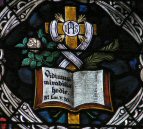 The Gospel:
The Liturgy of the Word is completed
by the reading of the Gospel. Before its reading, the members of the
assembly trace the sign of the cross upon the forehead to indicate their mental
acceptance of the Truth, on the lips to indicate their readiness to announce it,
and over the heart to indicate their sincere desire to accept it into their
lives. The "Good News" of the Gospel tells that God's kingdom has come for
all to hear, accept, and announce to the world for its salvation. It
is God who is speaking to us. Christ comes to teach us by the example of
His life and by His own words.
The Gospel:
The Liturgy of the Word is completed
by the reading of the Gospel. Before its reading, the members of the
assembly trace the sign of the cross upon the forehead to indicate their mental
acceptance of the Truth, on the lips to indicate their readiness to announce it,
and over the heart to indicate their sincere desire to accept it into their
lives. The "Good News" of the Gospel tells that God's kingdom has come for
all to hear, accept, and announce to the world for its salvation. It
is God who is speaking to us. Christ comes to teach us by the example of
His life and by His own words.
Priest: Cleanse my heart and my lips, almighty God, that I may worthily proclaim your
holy Gospel. Through the words of the Gospel may our sins be wiped away.
Priest: The Lord be with you.
All: And
also with you.
Priest/Deacon: A
reading from the holy Gospel according
to Matthew.
All: Glory
to you, Lord.
The Gospel: Matthew 15:21-28
Matthew wrote to show that Christ
was the
Messiah and fulfilled the Jewish prophecies.
 At
that time, Jesus withdrew to the region of Tyre and Sidon. And behold, a
Canaanite woman of that district came and called out, “Have pity on me, Lord,
Son of David! My daughter is tormented by a demon.” But Jesus did not say a
word in answer to her. Jesus’ disciples came and asked him, “Send her away, for
she keeps calling out after us.” He said in reply, “I was sent only to the lost
sheep of the house of Israel.” But the woman came and did Jesus homage, saying,
“Lord, help me.” He said in reply, “It is not right to take the food of the
children and throw it to the dogs.” She said, “Please, Lord, for even the dogs
eat the scraps that fall from the table of their masters.” Then Jesus said to
her in reply, “O woman, great is your faith! Let it be done for you as you
wish.” And the woman’s daughter was healed from that hour.
At
that time, Jesus withdrew to the region of Tyre and Sidon. And behold, a
Canaanite woman of that district came and called out, “Have pity on me, Lord,
Son of David! My daughter is tormented by a demon.” But Jesus did not say a
word in answer to her. Jesus’ disciples came and asked him, “Send her away, for
she keeps calling out after us.” He said in reply, “I was sent only to the lost
sheep of the house of Israel.” But the woman came and did Jesus homage, saying,
“Lord, help me.” He said in reply, “It is not right to take the food of the
children and throw it to the dogs.” She said, “Please, Lord, for even the dogs
eat the scraps that fall from the table of their masters.” Then Jesus said to
her in reply, “O woman, great is your faith! Let it be done for you as you
wish.” And the woman’s daughter was healed from that hour.
Priest/Deacon: The Gospel of the Lord.
All: Praise
to you, Lord Jesus Christ.
The Priest's Sermon:
The priest develops, explains, and comments upon the Master's words,
so our minds may be
enlightened, and our
hearts enriched.
(A priestly reflection upon this Gospel)
General Intercessions: We pray for the needs of the pope, civic leaders, our own needs, those of others, the sick, the dying, those who have died, the church, and the world. The response of all to each intercession: Lord, hear our prayer.
All: Lord,
hear our prayer.
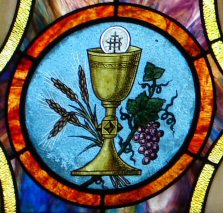 The Liturgy of the Eucharist
The Liturgy of the Eucharist
Gifts of bread and wine symbolizing ourselves are presented to the priest who will offer them to God the Father. Through the Holy Spirit, they will become the Body and Blood of Jesus Christ whom we receive in Holy Communion. Jesus unites Himself with us for our spiritual nourishment and strength. Today, when individuals do not present their own personal offerings of bread and wine, the monetary contribution symbolizes the material of their united sacrifice.
Preparation of the Bread and Wine:
Priest: Blessed are you, Lord, God of all creation, for through your goodness we have
received the bread we offer you;
fruit of the earth and work of human hands, it will become for us the bread of life.
All:
Blessed be God for ever.
Priest: By the mystery of this water and wine may we come to
share in the divinity of Christ, who humbled himself to share
in our humanity.
Priest: Blessed are you, Lord God of all creation, for through your goodness we have
received the wine we offer you; fruit
of the vine and work of human hands it will become our spiritual drink.
All: Blessed be God for ever.
Priest: Lord God, we ask you to receive us and be pleased with the sacrifice we offer you with humble and contrite hearts.
The Priest's Hands are Washed: This act was traditional necessary because the priest handled the various gifts presented by the people. Now, the cleansing act using water reminds the priest and ourselves of the need to cleanse not only the hands but the soul. Soon, the priest's hands will hold the actual body of Christ, and we will become His dwelling place.
Priest: Lord,
wash away my iniquity; cleanse me from my sin.
Pray, brethren, that
my sacrifice and yours may be acceptable to God, the almighty Father.
All: May the Lord accept the sacrifice at your hands, for the praise and glory of his
name, for our good, and the good of all his holy Church.
Prayer over the Gifts: Speaking in our name, the priest asks the Father to accept the gifts we offer through him.
Priest: Receive our oblation, O Lord, by which is brought about a glorious exchange, that, by offering what you have given, we may merit to receive your very self. Through Christ our Lord.
Eucharistic Prayer: (Number Four: The priest may select from several forms).
Priest: The Lord be with you.
All: And with your
spirit.
Priest: Lift up your hearts.
All: We lift them up to the Lord.
Priest: Let us give thanks to the Lord, our God.
All: It is right
and just.
Preface Prayer:
Priest: It is truly right and just, our duty and our salvation, always and everywhere to give you thanks, Lord, holy Father, almighty and eternal God. For you so loved the world that in your mercy you sent us the Redeemer, to live like us in all things but sin, so that you might love in us what you loved in your Son, by whose obedience we have been restored to those gifts of yours that, by sinning, we had lost in disobedience. And so, Lord, with all the Angels and Saints, we, too, give you thanks, as in exultation we acclaim:
Acclamation:
Priest / All: Holy, Holy, Holy Lord, God of power and might, Heaven and earth are full of your glory. Hosanna in the highest. Blessed is he who comes in the name of the Lord. Hosanna in the highest.
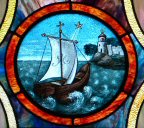
Priest: We give you praise, Father most holy, for you are great and you have fashioned all your works in wisdom and in love. You formed man in your own image and entrusted the whole world to his care, so that in serving you alone, the Creator, he might have dominion over all creatures. And when through disobedience he had lost your friendship, you did not abandon him to the domain of death. For you came in mercy to the aid of all, so that those who seek might find you. Time and again you offered them covenants and through the prophets taught them to look forward to salvation.
And you so loved the world, Father most holy, that in the fullness of time you sent your Only Begotten son to be our Savior. Made incarnate by the Holy Spirit and born of the Virgin Mary, he shared our human nature in all things but sin. To the poor he proclaimed the good news of salvation, to prisoners, freedom, and to the sorrowful of heart, joy. To accomplish your plan, he gave himself up to death, and, rising from the dead, he destroyed death and restored life.
And that we might live no longer for ourselves but for him who died and rose again for us, he sent the Holy Spirit from you, Father, as the first fruits for those who believe, so that, bringing to perfection his work in the world, he might sanctify creation to the full.
Therefore, O Lord, we pray: ma this same Holy Spirit graciously sanctify these offerings, that they may become the Body and Blood of our Lord Jesus Christ for the celebration of this great mystery, which he himself left us as an eternal covenant.
The priest repeats the words which
Christ used at his Last Supper when He changed the bread into His Body and the
wine into His Blood. His Body and Blood are truly present but under the
appearance of bread and wine. The death of Christ is prolonged in each of
those who receive Him worthily. We apply His death to ourselves so that we
may share His glory. This moment is the most solemn on earth because it is
Divine act which enables us to apply to ourselves the Cross which Christ
willingly took upon Himself.
We are called to die to
sin and lift our very selves to God so that we become changed; to do as God
would have us do, to become what
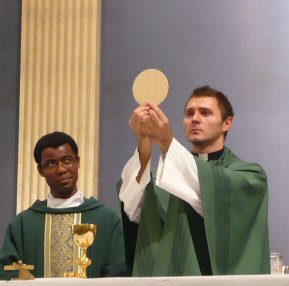 God
would have us become. Our own little cross can lift us into union with
Christ's Cross so we may earn the joys of everlasting happiness with God the
Father.
God
would have us become. Our own little cross can lift us into union with
Christ's Cross so we may earn the joys of everlasting happiness with God the
Father.
The Lord's Supper: For when the hour had come for him to be glorified by you, Father most holy, having loved his own who were in the world, he loved them to the end: and while they were at supper, he took bread, blessed and broke it, and gave it to his disciples, saying:
Take this, all of you, and eat of it, for this is my Body, which will be given up for you.
In a similar way taking the chalice filled with the fruit of the vine, he gave thanks, and gave the chalice to his disciples, saying:
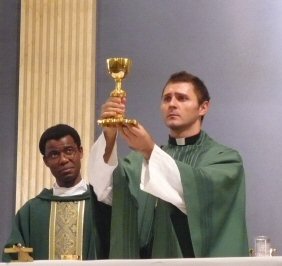 Take this, all of you, and drink from it, for
this is the chalice of my Blood, the Blood of the new and eternal covenant,
which will be poured out for you and for many for the forgiveness of sins.
Do this in memory of me.
Take this, all of you, and drink from it, for
this is the chalice of my Blood, the Blood of the new and eternal covenant,
which will be poured out for you and for many for the forgiveness of sins.
Do this in memory of me.
Memorial Acclamation: (The priest may
select from several forms).
Priest: The
mystery of faith.
Priest
/ All: When we
eat this Bread and drink this Cup, we proclaim your Death, O Lord, until you
come again.
Therefore, O Lord, as we now celebrate the memorial of our redemption, we remember Christ's Death and his descent to the realm of the dead, we proclaim his Resurrection and his Ascension to your right hand, and, as we await his coming in glory, we offer you his body and Blood, the sacrifice acceptable to you which brings salvation to the whole world.
Look, O Lord, upon the Sacrifice which you yourself have provided for your Church, and grant in your loving kindness to all who partake of this one Bread and one chalice that, gathered into one body by the Holy Spirit, they may truly become a living sacrifice in Christ to the praise of your glory.
Therefore, Lord, remember now all for whom we offer this sacrifice: especially your servant ____ our Pope, ____ our Bishop, and the whole Order of Bishops, all the clergy, those who take part in this offering, those gathered here before you, your entire people, and all who seek you with a sincere heart. Remember also those who have died in the peace of your Christ and all the dead, whose faith you alone have known.
To all of us, your children, grant, O merciful Father, that we may enter into a heavenly inheritance with the Blessed Virgin Mary, Mother of God, with Blessed Joseph her spouse, and with your Apostles and Saints in your kingdom.
There, with the whole of creation, freed from the corruption of sin and death, may we glorify you through Christ our Lord, through whom you bestow on the world all that is good.
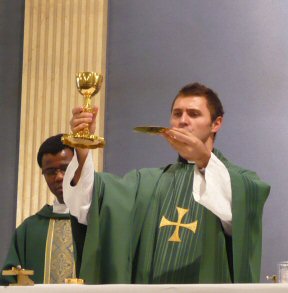 Doxology:
Doxology:
Prayer of Praise:
Through
him, with him, and in him, O God, almighty Father, in the unity of the Holy
Spirit, all glory and honor is yours, for ever and ever.
All: Amen.
Communion Rite
In the Liturgy of the Eucharist, we symbolically offer ourselves to the Lord through the gifts of bread and wine. At the Consecration, we offer our very lives to be united the God the Father through the Cross of Christ. In Communion, we find that we have not died at all, but have come to life. We have surrendered ourselves to God through His Divine Son, Jesus Christ. In return become ennobled and enriched. We give up time and we get eternity, we give up our sin and we receive grace, we surrender our self-will and receive the strength of the Divine Will, we give up ourselves and we receive everything. For the Son of God says to us that unless we receive Him we shall not have Divine life in us. But it is not really we who receive Christ as it is Christ who receives us, bringing us into Himself.
God makes His Cross the very means of our salvation and our life. While we have crucified Him, His eternal love cannot be extinguished. Christ willed to give us the very life we crucified in our Redemption, the Consecration of Holy Thursday into Communion, His death into our everlasting life.
The Lord's Prayer:
Priest: Jesus taught us to call God our Father, and so we have
the courage to say:
Priest and
All: Our
Father, who art in heaven, hallowed be they name; Thy kingdom come; Thy will be
done on earth as it is in
heaven. Give us this
day our daily bread; and forgive us our trespasses as we forgive those who
trespass against us; and lead us not into temptation, but deliver us from evil.
All: For the kingdom, the power and
the glory are yours, now and for ever.
Prayer for Peace:
Priest and All: Lamb of God, you take away the sins of the
world, have mercy on us.
Lamb of God, you take away the sins of the world, have mercy on us.
Lamb
of God, you take away the sins of the world, grant us peace.
Communion of
the Priest:
Priest: May the receiving of your Body
and Blood, Lord Jesus Christ, not bring me to judgment and condemnation, but
through your loving mercy be fore me protection in mind and body and a healing
remedy.
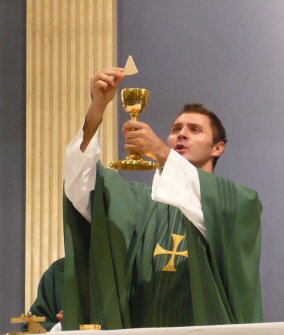 Priestly Preparation: Lord Jesus Christ, Son of the living God, who by the will of the Father and the
work of the Holy Spirit, through
your death gave life to the world. By your holy body and blood free me
from all my sins, and from every evil. Keep me faithful to your teaching,
and never let me be parted from you.
Priestly Preparation: Lord Jesus Christ, Son of the living God, who by the will of the Father and the
work of the Holy Spirit, through
your death gave life to the world. By your holy body and blood free me
from all my sins, and from every evil. Keep me faithful to your teaching,
and never let me be parted from you.
Priest: This is the Lamb of God who takes away the sins of the world. Happy are
those who are called to his supper.
Priest and All: Lord,
I am not worthy to receive you, but only say the word and I shall be healed.
Priest: May the Body of Christ keep me safe for eternal life.
May the Blood of Christ keep me safe for eternal life.
Communion Antiphon:
Psalm: 130:7 With the Lord there is mercy; in him is plentiful redemption.
Communion of the Faithful:
Priest: The Body of Christ.
The Faithful: Amen.
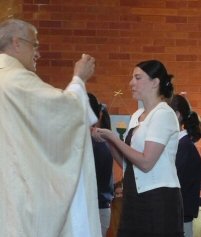
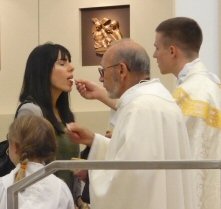
Priest/Deacon/
Extraordinary Eucharistic Minister:
The Blood of Christ.
The Faithful: Amen.
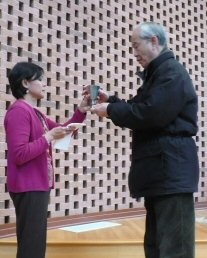
Cleansing of the Vessels:
Priest: Lord, may I receive these gifts in purity of heart. May they bring me healing and strength, now and for ever.
Prayer after Communion:
Priest: Let us pray.
Priest: Made partakers of Christ through these Sacraments, we
humbly implore your mercy, Lord, that, conformed to his image on earth, we may
merit also to be his coheirs in heaven. Who lives and reigns for ever and
ever.
Concluding Rite
Priest: The Lord be with you.
All: And
with your spirit.
Priest: Bow
down for the blessing.
Dismissal Prayer: (The priest may select from several forms)
Priest: May your heavenly favor, O Lord, we pray, increase in
number the people subject to you and make them always obedient to your commands.
Through Christ our Lord.
All: Amen.
Priest: And may the blessing of almighty God, the Father, and the
Son, and the Holy Spirit, come down on you and remain with you for ever.
All: Amen.
Priest: Go in peace, glorifying the Lord by your life.
All: Thanks be to God.
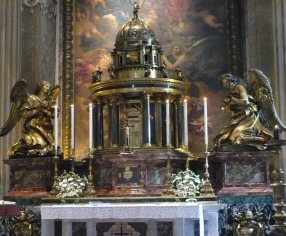 O my Jesus, forgive us our sins.
O my Jesus, forgive us our sins.
Save us from the fires of hell.
Lead all souls to heaven,
especially those in most need of your mercy.
www.Divinemasterplanforlife.com
www.Saintsnheaven.com
Top
Home Page
Liturgical
Year Cycle A 13-14